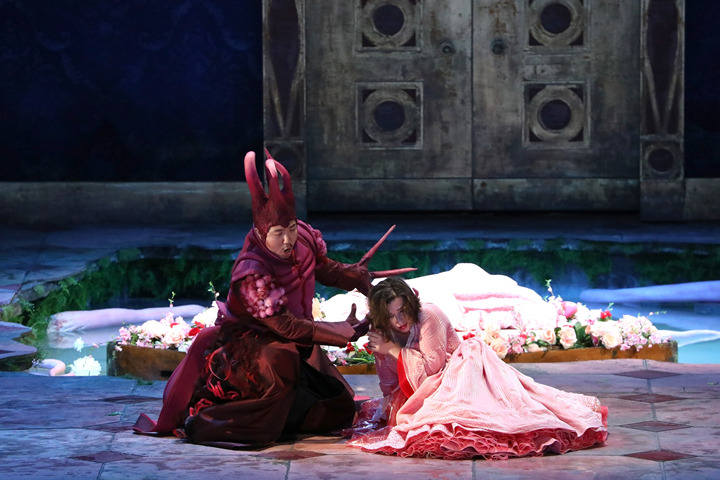| Opera Reviews | 4 May 2024 |
Rusalka finally arrives at La Scalaby Silvia Luraghi |
|
Dvořák: Rusalka |
|
 |
|
|
Believe it or not, Antonin Dvořák’s opera Rusalka which premiered in 1901 and since then has been seen all over the world, had never been shown at Milan’s Teatro alla Scala. The long overdue company premiere finally took place on June 6 and was reportedly very successful. I saw the second performance, in an almost sold out house, with an attentive audience visibly enjoying the evening. The production, directed by Emma Dante, gave a fairy tale, dreamy interpretation of the unhappy nymph’s story. Set designer Carmine Maringola set the first and third acts with the background of the ruins of a Gothic church, partly flooded and covered with vegetation. Nature was pervasive in the second act as well, which opened with the view of a forest then turned into the Prince’s palace, with the floor flooded. Dancers dressed as wild animals, hunters and nymphs are ubiquitous. The fancy costumes, designed by Vanessa Sannino, contributed to the magical setting. Rusalka enters the stage on a wheelchair: being a nymph, she does not have legs but long pink tentacles. The tentacles are then removed when Ježibaba the witch turns Rusalka into a human being: she now has legs, but she keeps staggering as if she could not adapt to her new human nature. In the second act, the human inhabitants of the castle visibly feel that she does not belong among them, and to make this feeling clear eagerly eat her tentacles during the banquet. In the third act, Rusalka is surrounded by the nymphs who, together with Ježibaba convince her to kill the prince. When he appears again desperately looking for her, she kisses him in front of a pond and causes his death with her kiss. In the title role, soprano Olga Bezsmertna sang passionately, with a flawless technique that permitted her to nuance her voice to express the nymphs emotions. Tenor Dmitry Korchak was a noble prince, displaying a handsomely colored voice that he could mold into pianissimi if needed, as in the final duet. Mezzo Okka von der Damerau, a Wagner specialist, was an unyielding, uncompromising Ježibaba, who did not show much sympathy for the betrayed and repenting Rusalka. Soprano Elena Guseva lent her ringing voice to the foreign princess, which she depicted as villainous and numb. I especially liked bass Jongmin Park in the role of the water goblin Vodník, a very concerned and worried father for Rusalka. For this premiere, the orchestra was skillfully led through the unfamiliar score by Czech conductor Tomáš Hanus. The performance was very successful, with a real ovation for the conductor.
|
|
| Text ©
Silvia Luraghi Photo Brescia e Amisano © Teatro alla Scala |
|







